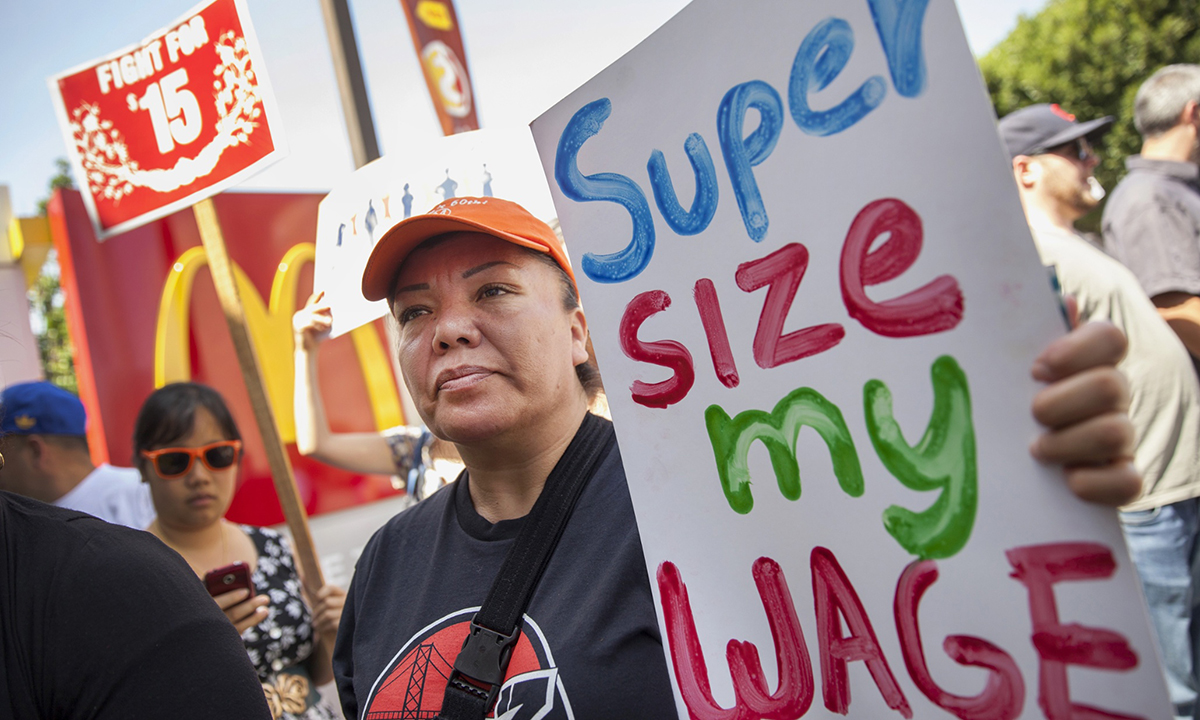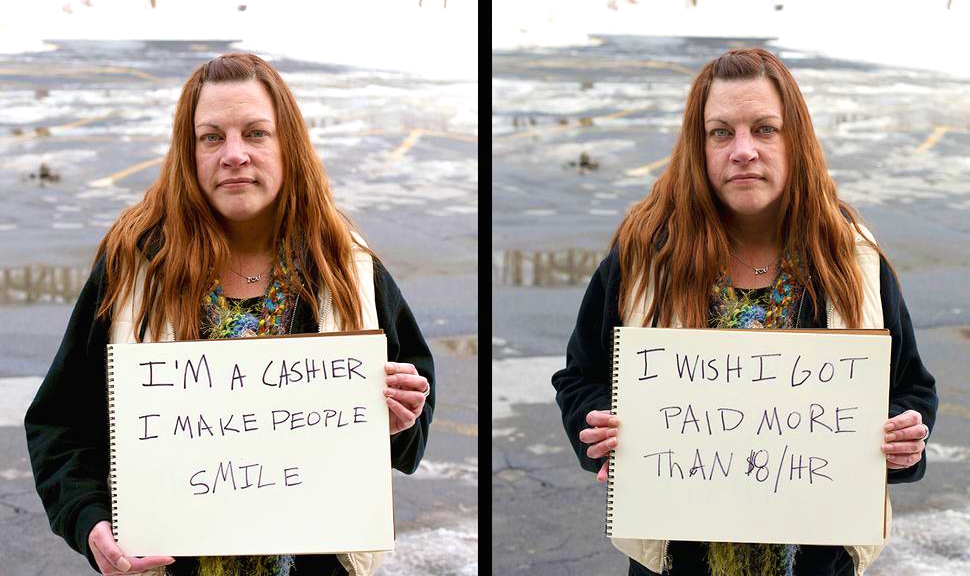
When the banks that engineered the 2008 global financial collapse needed a bailout from the federal government to avoid going under, Congress spared no time in giving them $700 billion up front, with no strings attached (the Fed’s first audit revealed that the bailout totaled approximately $16 trillion. So why should America’s minimum wage earners have to settle for a meager raise in their salaries to be “phased in” over a period of five to seven years?
In response to grassroots pressure, Seattle, San Francisco and Los Angeles have all agreed to implement a $15 an hour minimum wage, which amounts to just $31,200 for a full-time worker each year before taxes. But this meager salary won’t be available in Seattle for workers at large employers (of 500 or more workers) until 2018, and 2022 for small employers. San Francisco’s minimum wage workforce won’t make $15 an hour until 2018. And Los Angeles workers won’t get their full raise until 2020. While municipal leaders should be commended for acknowledging the current wage is too low, phasing in a higher wage is unacceptable for workers in an economy where costs of living are steadily rising and wages are stagnant or falling.
According to a study by rental housing website Apartment List, rents have risen by 6 percent between 2000 and 2012, while tenants’ income dropped by 13 percent over the same period of time. This problem is exacerbated in high cost-of-living cities like New York, Seattle, Los Angeles, and San Francisco. While the acceptable rent burden is 30 percent of monthly income, rents in cities like these are largely unaffordable, even for someone making $31,200 a year.
In Los Angeles, for example, the Economic Policy Institute found that for a single, childless person in Los Angeles to live in acceptable conditions, s/he would have to bring in at least $34,324 per year. A single parent of one child would need to earn at least $60,600. In Seattle, an inexpensive apartment would still require 34 percent of monthly income for someone making $15 an hour. For renters in San Francisco earning that much, they would still need to set aside at least 36 percent of their income.
In New York City, comptroller Scott Stringer is outspoken in his support for a $15/hour minimum wage to be phased in by 2019. But a cheap apartment in the Bronx still costs roughly $1,000 a month, and a Metrocard currently costs $116.50. Even just those two most basic expenses for a New Yorker already eat up almost 50 percent of someone's salary if s/he makes $15 an hour today, let alone four years from now. And if the minimum wage had kept up with worker productivity, it would be $21.72 an hour today.
So, to be clear, $15 an hour now is neither an unreasonable nor irrational demand. By contrast, the default argument against increasing the minimum wage is the alleged harm it will do to businesses. This can be negated by simply restructuring existing corporate entitlement programs already in place.
According to a 2014 report by Good Jobs First, just 965 corporations have received over 75 percent of all state business subsidies. Fortune 500 companies – by definition the most successful and profitable in the world – received $63 billion in taxpayer handouts. Good Jobs First found that out of 441,000 entitlement programs (277,000 state and local; 164,000 federal), those 965 corporations received a total of 25,000 entitlements worth $110 billion through various subsidiary corporations.
Boeing leads the pack, receiving approximately $13 billion in federal and state entitlements. The company receiving the highest number of entitlements is Dow Chemical, with 416 to its name. Berkshire Hathaway, which is owned by Warren Buffett – one of the wealthiest men in the world – received 310 entitlements worth over $1 billion collectively. Other top recipients include Alcoa, General Motors, Walmart, and FedEx. Obviously, companies raking in billions in profits don’t need to be on the taxpayer dole, especially when small businesses struggling to stay afloat could put that money to much better use.
If states and the federal government were to implement new restrictions on corporate entitlements that would make it impossible for any corporation with profits over, say, $100 million per year, to qualify for public assistance. It would be no different than the current income restrictions on working families applying for help with their winter heating bill or food stamps. These restrictions would also apply to any corporate subsidiary whose parent company makes over $100 million in annual profits.
This would free up billions of dollars in state aid to go to small local businesses, specifically to offset the cost of implementing immediate minimum wage increases. Subsidies could be given out based on the number of employees at a company and how much that company currently makes in profits. Businesses would also see a side benefit of having all their employees suddenly experience a significant raise.
It’s long been proven that in the wake of a minimum wage increase, more money cycles throughout a local economy, creating more demand for goods and services. As more people spend more money at local businesses, these businesses have to hire more people to keep up. In July of 2014, the U.S. Department of Labor released a report showing that in 13 states that experienced minimum wage increases, average job growth was 0.85 percent from January through June, outpacing states in which the minimum wage remained the same, where average job growth was just 0.61 percent.
Our economy isn’t powered by a handful of wealthy CEOs and investors, but by the rank-and-file workers who make sandwiches, wait tables, deliver goods, stock shelves and operate registers. These workers deserve, at the very least, a living wage that allows them to pay their bills and exist in dignified conditions. The minimum wage needs to be at least $15 an hour, indexed to inflation, and implemented immediately – not five to seven years from now.
3 WAYS TO SHOW YOUR SUPPORT
- Log in to post comments















